
Basque (; euskara ) is a language spoken by Basques and others of the Basque Country, a region that straddles the westernmost Pyrenees in adjacent parts of northern Spain and southwestern France. Linguistically, Basque is a language isolate. The Basques are indigenous to, and primarily inhabit, the Basque Country. The Basque language is spoken by 28.4% (751,500) of Basques in all territories. Of these, 93.2% (700,300) are in the Spanish area of the Basque Country and the remaining 6.8% (51,200) are in the French portion.
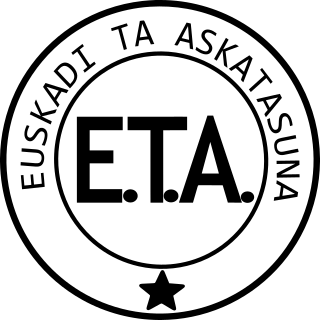
ETA, an acronym for Euskadi Ta Askatasuna, was an armed Basque nationalist and far-left separatist organization in the Basque Country between 1959 and 2018, with its goal being independence for the region. The group was founded in 1959 during the era of Francoist Spain, and later evolved from a pacifist group promoting traditional Basque culture to a violent paramilitary group. It engaged in a campaign of bombings, assassinations, and kidnappings throughout Spain and especially the Southern Basque Country against the regime, which was highly centralised and hostile to the expression of non-Castilian minority identities. ETA was the main group within the Basque National Liberation Movement and was the most important Basque participant in the Basque conflict.
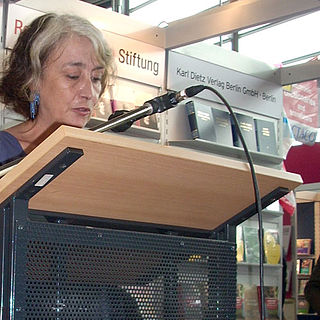
Arantxa Urretabizkaia Bejarano, is a contemporary Basque writer, screenwriter and actress. She was born in Donostia-San Sebastián, Guipúzcoa, País Vasco.

Kirmen Uribe is a Basque language writer. He won the National Prize for Literature in Spain in 2009 for his first novel Bilbao-New York-Bilbao, which has been translated into over 15 languages. His poetry collection Meanwhile Take My Hand, translated into English by Elizabeth Macklin, was a finalist for the 2008 PEN Award for Poetry in Translation. His works have been published in The New Yorker, Open City and Little Star.
The verb is one of the most complex parts of Basque grammar. It is sometimes represented as a difficult challenge for learners of the language, and many Basque grammars devote most of their pages to lists or tables of verb paradigms. This article does not give a full list of verb forms; its purpose is to explain the nature and structure of the system.

Felipe Arrese Beitia, born in Otxandio, was a Spanish poet, writer and sculptor, from Biscay. He wrote elegies about the perceived imminent demise of the Basque language. He also studied painting in the city of Vitoria.

Alan Roy King was a British linguist notable for his work on minority languages Basque and Nawat. He was an independent scholar engaged in grammatical description, language recovery, teaching material development and translation projects for Basque, Nawat and Lencan . King was Member of the Grammar Committee of the Royal Academy of the Basque Language (Euskaltzaindia) since 1985 and Corresponding member since 2003.

María Dolores González Katarain, also known as Yoyes, was an iconic woman leader of Basque terrorist group ETA, who became a symbol because of the tragic circumstances of her life.

Elena Odriozola, born in Donostia – San Sebastián is an illustrator of books for children and young adults. For her lasting contribution to children's literature she received the Golden Apple of the Biennial of Illustration Bratislava (2015) for her work illustrating in 2013 Frankenstein or The Modern Prometheus.

Yolanda Arrieta Malaxetxeberria is a Basque writer. She completed her teaching studies in the school of teachers of Ezkoriatza, in the speciality of Basque Philosophy. After that, she studied theater at the Antzerti school and finally, she studied Cultural and Social Anthropology, at the Faculty of Philosophy and Educational Sciences of San Sebastián. Her greatest activity has always been literature, mainly as a creative writer and also conducting literary workshops and fostering a taste for Literature and Reading.
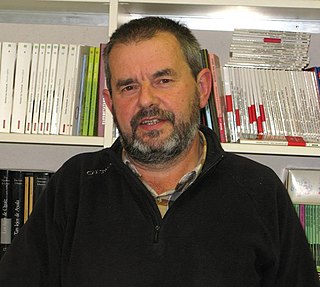
Joxantonio Ormazabal (1948–2010) was a Basque and Spanish author of primarily children's literature in the Basque language. He also published under the pen name of Joxean.

Patxi Zubizarreta is a Spanish writer who writes in the Basque language (Euskara). He studied Basque philology in Vitoria, where he currently resides. He is an author of children's and youth literature, a specialty in which he has won several prizes, has also been dedicated to translation and literature for adults and has a facet as creator of shows that combine music, image and literature. He was included in the White Ravens catalog and the IBBY Honor Roll.

Mikel Zalbide Elustondo is a Basque linguist and sociolinguist.
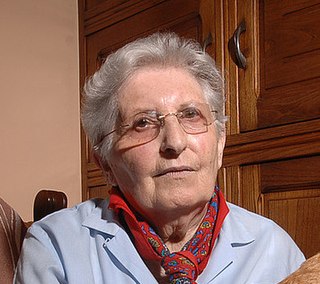
Marijane Minaberri or Marie-Jeanne Minaberry was a Basque author and radio broadcaster. She began writing articles for herself at the age of 20 and then worked as Banca's town hall municipal secretary for a decade. Minaberri then taught 10 and 11-year-old students at Bayonne's Saint Louis de Gonzague church before beginning a broadcasting career on Radio Côte Basque, Gure Irratia and Lapurdi Irratia. She wrote a series of poems and children's stories in both Basque in French and was a member of the Euskaltzaindia. Minaberri is considered a pioneer in Basque radio broadcasting and researchers consider two of her works the beginning of learning of Basque children's literature.

Arantza Urkaregi is a mathematician, union organizer, and feminist politician. Within mathematics, she writes, researches, and teaches predominantly about statistics. With regards to her political work, she was involved in the communist party in Basque and the early feminist movement there.
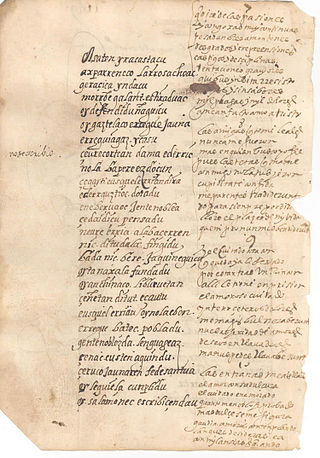
16th-century Basque literature begins with three authors considered classics: Joan Perez de Lazarraga, Bernard Etxepare and Joanes Leizarraga. In the manuscript of the first of them, discovered in 2004, the influence of the traditional court lyric, the Italian novela pastoril and the popular Basque templates can be observed. In the case of Etxepare, often compared to the Archpriest of Hita, the influence of French literature has been mentioned. Regarding Leizarraga, translator into Basque of the New Testament and other works on religious themes, he stands out for his attempt to find a unified language—a concern of many of the later authors—and for his use of cultured verbal forms and compound sentences, nonexistent in written literature up to that time.
Izar Algueró Txibite is a Spanish film, theater and television actress, singer, bertsolari and dancer.

Katixa Agirre Miguelez is a Spanish writer of Basque origin. She was born in Gasteiz in 1981. She studied audiovisual communication at UPV/EHU, graduating in 2003. She obtained a master's degree in screenwriting, followed by a PhD in audiovisual communication, also from UPV/EHU, receiving her doctorate in 2010. Her thesis analyzed the representations of the Lolita myth in Hollywood films. She then did postdoctoral work, including stints at QMUL and University of East Anglia in the UK. Since 2013, she has taught at the Universidad del Pais Vasco.

Uxue Alberdi Estibaritz is a Basque writer and bertsolari.

Miren Amuriza Plaza is a Spanish bertsolari and Biscayan writer. She has collaborated with some music groups, singing and writing lyrics. In 2017, she was the recipient of the Premio Igartza.


















